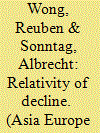|
|
|
Sort Order |
|
|
|
Items / Page
|
|
|
|
|
|
|
| Srl | Item |
| 1 |
ID:
123619


|
|
|
|
|
| Publication |
2013.
|
| Summary/Abstract |
Media attention is unevenly allocated across global human rights problems, prompting anger, frustration, and recrimination in the international system. This article demonstrates that from 1981 to 2000, three leading Anglo-American media sources disproportionately covered Latin American abuses, in human rights terms, as compared to other world regions. This "Latin Human Rights Bias" runs counter to broader trends within the Anglo-American general coverage of foreign news, where Latin America's share of reporting is far smaller. The Bias is partially explained by the region's proximity to the United States (US), its relevance to US policy debates, and by path dependency. A significant portion of the Latin Bias remains unexplained, however, despite our best attempts to rigorously model explanations offered by leading Western journalists. These findings suggest that geographic regions are an important factor in the media's perception of global human rights problems and that both human rights policymakers and scholars may be inappropriately drawing general lessons from regionally specific and biased patterns. We conclude with suggestions for future research.
|
|
|
|
|
|
|
|
|
|
|
|
|
|
|
|
| 2 |
ID:
111029


|
|
|
|
|
| Publication |
2012.
|
| Summary/Abstract |
This article is an attempt, in the context of the Eurozone crisis that has shaken Europe since 2008, to explore and deconstruct two pieces of conventional wisdom on French leadership in Europe and the world. The stereotypical image of a country in decline and denial, out of touch with today's globalised world, is reproduced so often in the Anglo-American media and even in scholarly discourse, that is has become a self-evident truism. The article examines this truism in two different perspectives: there is, on the one hand, the axiom that France has lost influence in Europe and that the balance of power has shifted inexorably to Germany and, on the other hand, the axiom that Europe does not matter in the global 'power shift' and that, as part of Europe, France does not count any more either. In questioning the origins and validity of these axioms, the authors argue that a strong perception bias persists and is constantly perpetuated even though reality has changed. Not only has France rather successfully adapted to globalisation in both political and economic terms, but it has also found new ways and discourses about its role as Germany's partner in leadership in the European Union. The paper goes on to show that both France and the EU retain and use significant levers for action in three dimensions of power-coercion, agenda-setting and attraction. It concludes that going into 2012, France remains an active and important actor, both in the EU and on the global scene. It is present and influential in major international institutions, effectively builds international coalitions and floats important ideas on reforming laissez-faire capitalism.
|
|
|
|
|
|
|
|
|
|
|
|
|
|
|
|
|
|
|
|
|